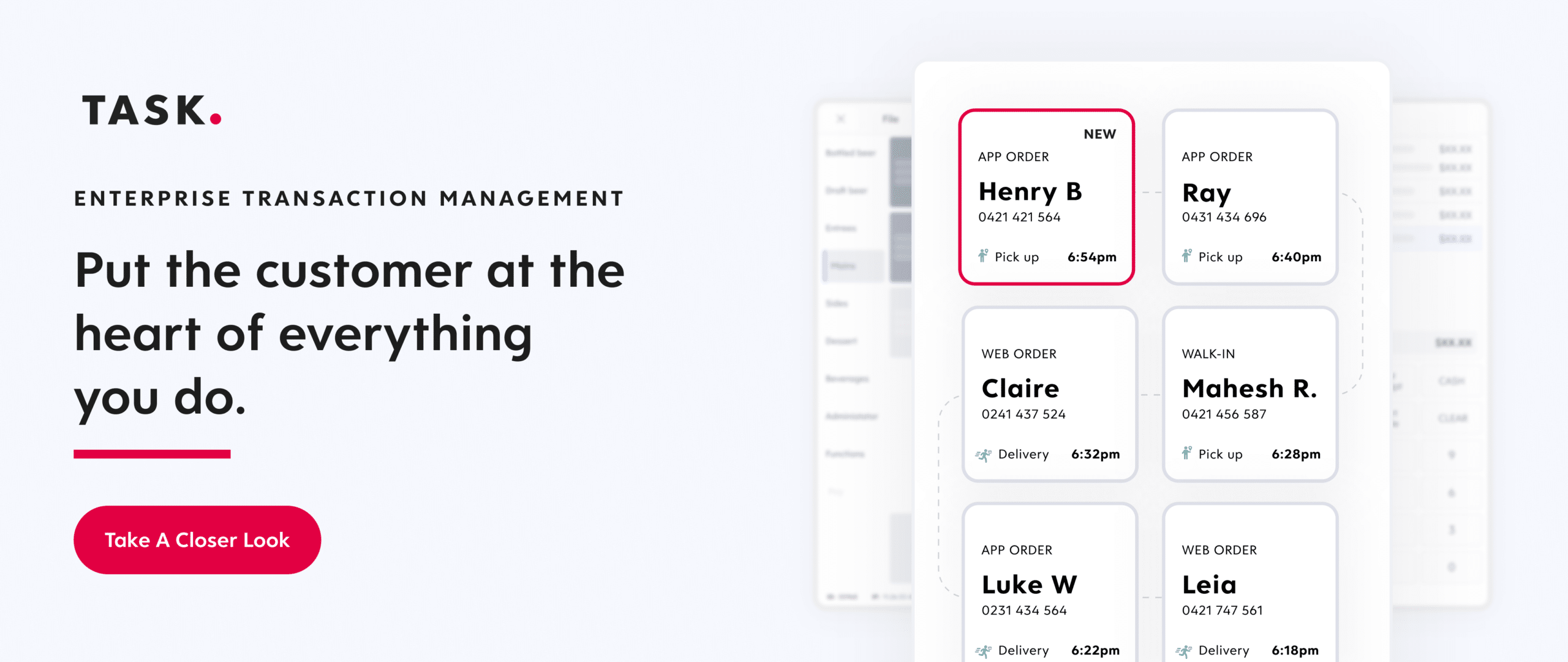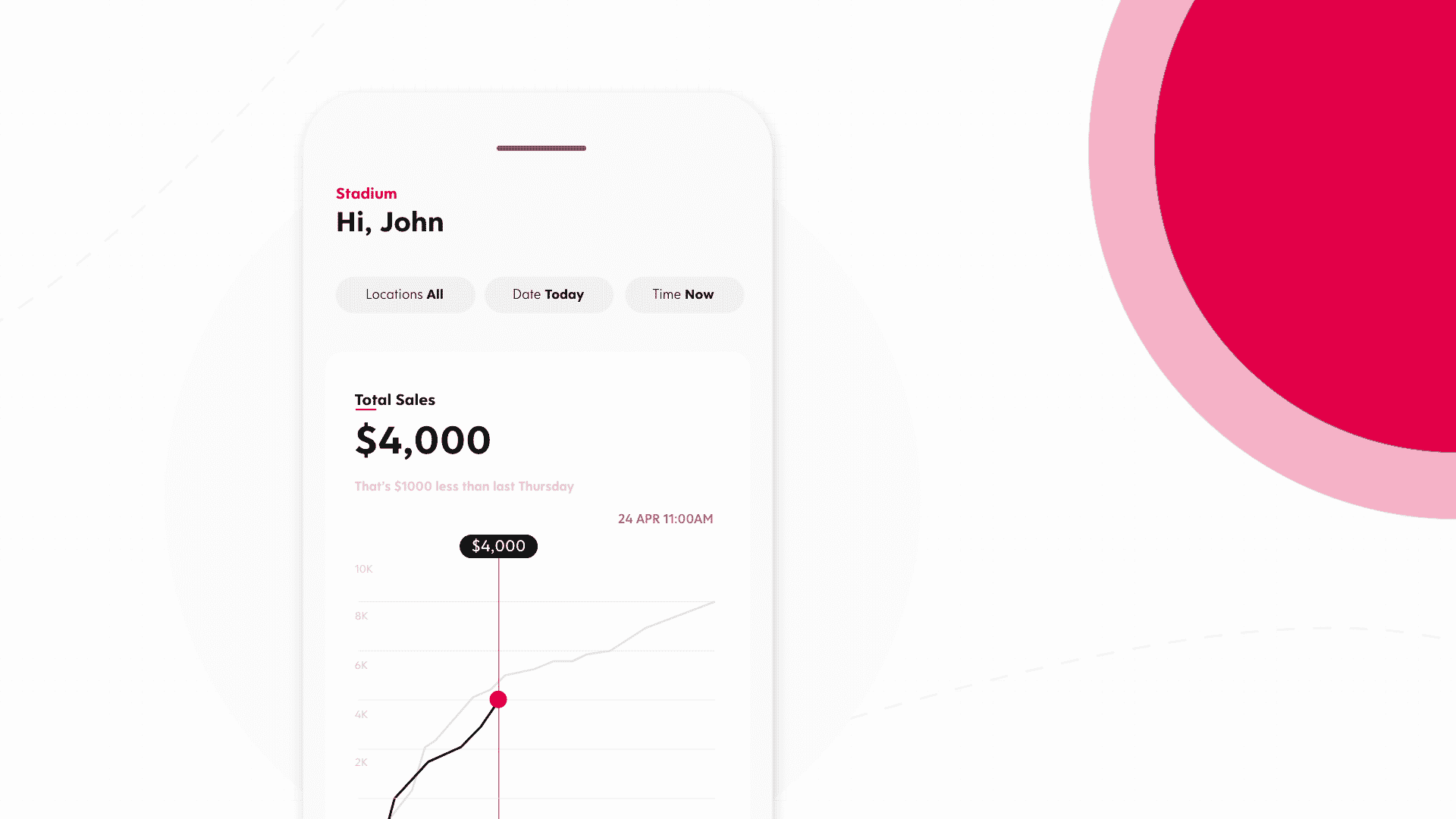Keeping up with the competition in today’s hospitality industry means driving forward phenomenal customer service while also cutting costs behind the counter.
Manually managing multiple transactions and operations such as staff schedules, kitchen inventory, and payroll accounts are quickly becoming a thing of the past. Instead, the world’s leading enterprise restaurant brands are turning to digital transaction management platforms to collate data across their channels and drive forward better efficiency and profitability.
What is a transaction management platform?
Customer interactions are the backbone of a thriving quick-service restaurant (QSR), but managing an enterprise day-to-day requires so much more than just supporting the front counter.
Transaction management is all about helping enterprise-related operations run smoothly behind the scenes. From bookkeeping to inventory control to payment processing to employee scheduling, a transaction management platform (TMP) is an integrated digital tool to help automate the bread-and-butter of running a business. It means better transparency, a clearer view of your account, and better opportunities to set and maintain a high standard.
For QSRs and fast-casual restaurants, investing in a TMP can significantly help tackle everyday challenges. If a point-of-sale system (POS) is the essential tool for managing customer interactions, then your TMP is what controls all transaction processing behind the counter.
All-in-one transaction management platforms integrate data and information collected across operations to show real-time progress and output. Not only does this help provide upper-level management with valuable enterprise insight, but it also helps employees at every level perform their job better by looking at all transactions.
A connected system means fewer steps between tasks – whether in the kitchen, the stock room, or at the table. Integrated data helps reduce miscommunication, optimize workflows, and lead to quicker service with fewer errors – improving value and strategic execution for your customers and your organization.
Investing in a transaction management platform actively helps hospitality businesses improve their operational efficiency. The key benefits include:
- Reducing human error
- Making the most of staff resources
- Tracking and controlling inventory
- Processing large quantities of data effortlessly
- Avoiding chargebacks
- Maintaining an audit trail
- Monitoring transactions for fraud
- Promoting smart menu engineering decisions
Considerations before opting for a TMP
You can think about the purpose of transaction management working in two ways. The first is the functionality of a TMP system – the smart organization of real-time information to help employees work more efficiently.
The second purpose is about collecting and analyzing every database transaction. TMPs provide accurate, all-encompassing data on how well and how effectively your systems and tools are working.
Before investing in a transaction management platform for your enterprise, you should explore and understand the key aspects of the digital solution and how it will affect your business.
Facilitate access to real-time sales data
From sales to labor dashboards, a transaction management platform provides immediate insights into your business performance metrics.
A TMP can tell you what menu item performs the best on Friday nights, or which one takes the longest to prepare, or what meal is the most popular with gift card users. A single solution platform gives you context beyond just the sales outcome or profit – and provides better views of the value of each customer and how to best accelerate your impact.
Transaction management platforms also provide a clear image of your internal workflow to help you make decisions in the kitchen and at the front counter. Say that you notice an increase in ordering mistakes and suspect a system failure. A TMP can help highlight which section in the kitchen is having trouble, or which button often gets missed when taking orders. Transaction management also helps spotlight outstanding employees who deserve extra recognition for their hard work.
A TMP collects data across all touchpoints simultaneously, and transaction information into easily understandable metrics. The result is an accurate and real-time picture of what is working well in your enterprise and what needs to be changed to provide a better service.
Integrate your database with a POS system
In order for a transaction management platform to work effectively across every digital tool, it should incorporate advanced machine learning technology for seamless database integration (and to better leverage and scale your loyalty program).
Your POS system handles customer-facing transactions, such as orders, digital payments, and loyalty programs. Whether placing an order through a mobile app, self-ordering kiosk, or front counter touch point, your POS collates data across the business into a single unified platform.
A TMP is designed to tap directly into the same digital system as your POS, allowing easy database sharing across all areas of your business.
Maximize Restaurant Operations With Your Digital Stack
Taking the inefficiency out of your restaurant technology starts with a fully integrated digital stack. Learn more about transaction management platforms, and they can help boost revenue and customer satisfaction.
Effectively manage inventory
As costs for food and goods continue to skyrocket, it’s never been more important to optimize your ordering and inventory process.
Part of the TMP suite includes tools to help track stock and automatically place orders. Rather than manually logging inventory and requesting deliveries, transaction management software digitally monitors everything behind the scenes. In practice, automated inventory management means one reliable system to keep track of food expiration dates, supply levels, and purchase cost changes.
When a particular food item is running low or nearing its value date, your TMP will immediately notify management and automatically set up a restock order request. When it comes to inventory control, smart technology helps support more accurate and complete information for restaurant businesses to execute ordering decisions. The result is saved time and more cost-effective stock management.
Identify single-solution enterprise options
Restaurant technology has come a long way in the last few years, and the pandemic has highlighted just how important it is for businesses to be able to quickly adapt to changing service demands.
In the hospitality industry, the best management platforms should make running a business easier at every level – from the kitchen floor to the upper-level marketing team. Digital management technology is designed to collate multiple digital tools into a single database transaction in order to facilitate easier decision-making.
If your business needs a digital overhaul, look for solutions that are:
- Integrated across every touch point
- An all-in-one platform solution
- Designed with advanced machine learning capabilities
John LaPorte, TASK President of North America, describes technology solutions as a “way to start clean.” As brands transform in today’s market, “it’s important to consider a sustainable digital platform that works intuitively across every enterprise channel.”
John points out, “It’s not enough to have the right digital tools – they also have to work effectively together. You need an all-in-one technology solution that helps create better customer experiences while also driving forward business revenue. At a certain point, you have to be prepared to let go of the system you’ve used in order to make space for a better, client-led solution.”
Focus on database scalability
The benefits of using a TMP are all about providing real-time visibility into your enterprise transactions and processes.
TMP technology is a single, usable operation management tool that helps brands make more informed and complete decisions. This is made possible through data integration across the cloud, connecting every touch point across a digital network for accurate information as it’s being collected.
Ensuring cross-platform compatibility
The purpose of a transaction management system is to connect systems and information across your business. Whether data is coming from a webpage, mobile app, or in-store hardware, your TMP should operate seamlessly from platform to platform.
These technology tools work agnostically, meaning they can run on any combination of digital systems with different underlying professor architectures.
Considering budget and ROI
Any digital overhaul requires an investment, which will vary in cost depending on the size and breadth of your business enterprise.
The benefit of going in for a transaction management platform to connect your technology stack is that it operates as a single solution, web-based delivery model.
While a TMP may feel like an upfront cost burden, it works consistently to improve cost savings overall. By replacing manual tasks with automation, a TMP helps free up more of your business resources and better optimize staff time, inventory, and operations.
A transaction management program isn’t a one-problem solution – it’s an ongoing tool for building a more efficient business.
QSR Digital Transformation
Learn more about the QSR digital transformation and how QSR technology is changing the way brands deliver exemplary customer experiences.
Making the most of end-to-end visibility and control
Transaction management goes further than just displaying sales data at the end of the day. Using smart technology, TMPs are able to track interactions by the second to uncover deeper insight into customer transaction behavior.
For example, if you find that customers abandon their cart halfway through an order, a transaction management platform can help explore why and when this happens. You may find a gap in the experience where customers aren’t able to amend their orders easily, delivery costs are too high, or there is a loading page error that needs to be addressed.
Transaction management software allows businesses to see the full digital customer journey, and therefore fix system failures quicker and more effectively.
Making blind decisions isn’t helpful to businesses or to customers, which is why data is so important in today’s hospitality world. Matching customer standards is about making the right decisions at the right time – and that is only possible with comprehensive, accurate information at your fingertips.
An all-in-one solution for QSRs and fast-casual restaurants
QSRs and fast-casual restaurants need technology that transforms high-level, complex transaction database stacks into usable interfaces and straightforward analytics. Your transaction management platform needs to be designed to help improve the hospitality experience by focusing on these areas:
Efficiency
Transaction management platforms are helping businesses make data-driven decisions to make the most out of their resources. A single solution is about enabling holistic access to real-time data across business operations.
This kind of technology is making it possible to streamline the everyday tasks of running a hospitality business – from bookkeeping to staff scheduling – to help automate processes and save time for managers.
Convenience
Restaurant technology should drive forward intuitive workflow and easier systems. Whether redesigning kitchen operations, curating better digital guest experiences, or reducing food waste with better inventory management, a successful transaction management platform drives forward automation. Let the automations handle the little things so that your people can focus on doing great work.
Integration
For seamless real-time insight, integration between touchpoints is crucial. A TMP should partner with industry leaders such as Uber Eats and Azure to help design for compatibilities not just within a business tech stack, but also across third-party tools and transaction platforms.
Scalability
Transaction management platforms offer a web-based delivery system. Rather than relying on hardware onsite, which takes up valuable space and requires clunky installation requirements, this technology is a powerful cloud-based solution that keeps your operations agile. That means fast, immediate access that can scale to suit the needs and size of your hospitality business.
How to get started
Transaction management is the bread and butter of restaurant technology in today’s digital age. Optimize your business operations at every level through automated efficiency solutions and watch your impact grow.
To take advantage of these benefits, businesses should consider adding a transaction management platform to their digital stack. From streamlining your bookkeeping system to managing stock to tracking employee time, this integrated technology can offer superior efficiency to businesses of all types and sizes.

